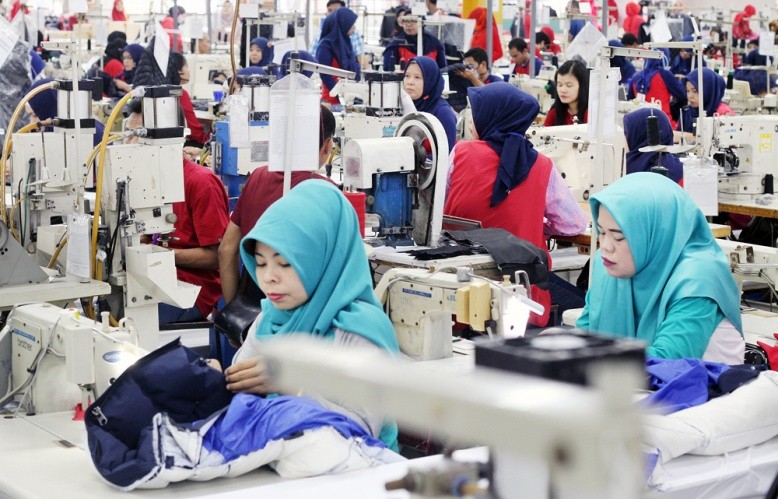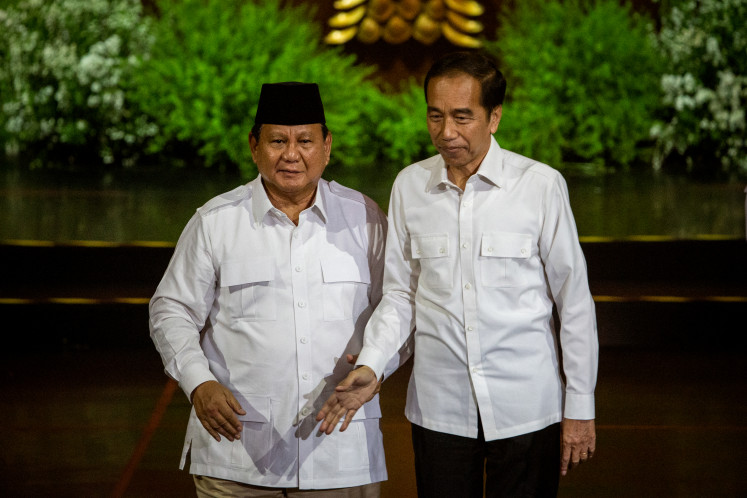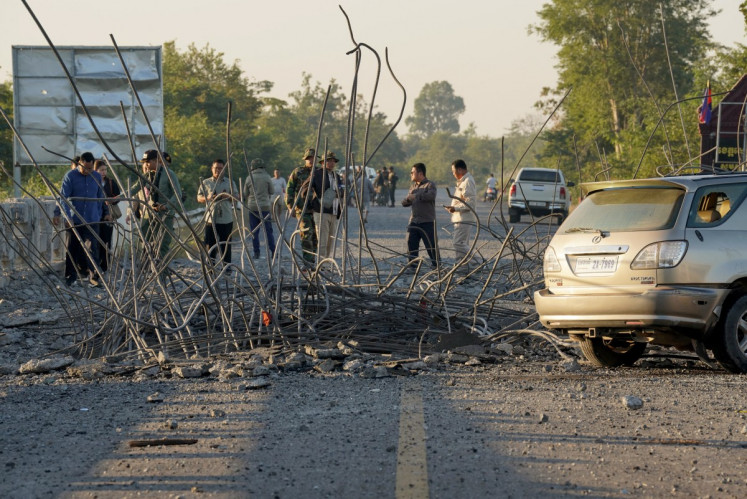Popular Reads
Top Results
Can't find what you're looking for?
View all search resultsPopular Reads
Top Results
Can't find what you're looking for?
View all search results[COMMENTARY] Workers, companies and govt, all stand to lose from labor unrest
Trade unions should instead take their fight to the Constitutional Court by filing a judicial review request if they still cannot accept the law’s provisions on worker rights and protection.
Change text size
Gift Premium Articles
to Anyone
 Factory fashions: Workers operate sewing machines at a garment factory in Bogor, West Java, in September 2018. The government wants Indonesia to be a top-five world textile producer by 2030, but several businesses in the industry have had to close amid tight competition. (Antara/Yulius Satria Wijaya)
Factory fashions: Workers operate sewing machines at a garment factory in Bogor, West Java, in September 2018. The government wants Indonesia to be a top-five world textile producer by 2030, but several businesses in the industry have had to close amid tight competition. (Antara/Yulius Satria Wijaya)
T
he continuing wave of labor unrest and demonstrations opposing the 2020 Job Creation Law, along with the government’s decision to freeze the current minimum wage for 2021, could cause more layoffs at a time when the unemployment rate has risen steeply to more than 10 percent in the economic fallout from the pandemic.
Labor leaders should think out of the box and not lose sight of the big picture: the vital need to stimulate private investment and businesses, because it is the private sector that generates jobs, not the government.
Jobs provide wages, which in turn generates consumer buying power. This is the process chain that propels the wheels of the economy.
Trade unions should instead take their fight to the Constitutional Court by filing a judicial review request if they still cannot accept the law’s provisions on worker rights and protection, despite the fact that most analysts have agreed that the new labor provisions are fair compared to other labor rules in ASEAN states.
It is true that stoking greater demand for labor through growing jobs, the main objective of the law, is as important as establishing the rules on worker protection and welfare. But overly protective regulations could choke growth in the formal sector, which is badly needed to absorb the huge number of job seekers.
Continuing with the mass demonstrations would not only heighten the risk of COVID-19 infection and street violence, but also undermine productive activities and scare off new potential investors in labor-intensive industries.
The intermittent bouts of labor unrest would also further hamper the economy that is already trapped in a deep recession. If trade unions continue to behave and act in a radical manner, potential investors will shun Indonesia.
For the estimated 90 million workers, or 70 percent of the national workforce, still laboring in the informal sector, this added uncertainty would also kill their chances of finding jobs in the formal economy. Workers in the informal economy are often paid twice as low as the legal minimum wage and are not protected under the labor laws.
It would be grossly irresponsible for union leaders to incite further unrest or demonstrations, considering the glutted labor market and the fact that almost 80 percent of job seekers have only completed secondary school and do not have marketable skills.
Labor leaders should instead fight for stronger enforcement of all prevailing labor laws and regulations, because labor is actually one of the most regulated and protected sectors in the country.
The regulatory context for employment is provided by the 2003 Manpower Law. Most recently, the new 2020 Job Creation Law revises provisions on such labor issues such as minimum wage, social security, dismissals, severance pay, contract and outsource workers.
Indonesia also has specific laws on trade unions (Law No. 21/2000), industrial disputes and settlements (Law No. 2/2004) and social security (Law No. 40/2004).
The effectiveness of labor inspection to support the protection of workers’ rights has been limited due to resource constraints, whereas employee bargaining power is quite weak.
Stronger labor inspection is needed to increase employer compliance with the regulated standards on workplace norms, freedom of association, minimum wage, social security, and occupational health and safety. The procedures at the Industrial Relations Court, which settles labor disputes, also need improving in terms of credibility.
Likewise, it is rather futile for union leaders to protest the minimum wage freeze for 2021, as the economy is projected to contract by 1 to 2 percent, while inflation forecast is below 2 percent this year. The 2015 minimum wage regulation has stipulated that provincial wages are adjusted to annual economic growth and inflation.
The 2015 minimum wage regulation ensures that formal workers get fair wage hikes according to the productivity rate and, at the same time, protects them against inflation.
The fixed formula provides certainty for employers in calculating production costs and thereby helps stimulate investment, despite the complex economic conditions and varying needs of workers and their families in the vast population across the Indonesian archipelago.
Union leaders should realize that, in the long run, wage increases that are not supported by a corresponding increase in productivity would only lead to higher unemployment, as a result of factories cutting their payrolls or investors shunning labor-intensive industries.
Managing peaceful industrial relations will depend very much on how capable factory or company trade unions are in developing effective bargaining relationships with their employers.
Employers have no less a vital role in preventing labor disputes. The contentment of their workers will depend on how forthcoming and transparent management is regarding the company’s condition and its willingness to acknowledge and enhance their workers’ capabilities in collective bargaining, as well as in allowing the participation of employee representatives in making company regulations and collective labor agreements.
It is important to get industrial relations back on track and find ways to balance the conflicting demands of employees and employers in matters of job security, welfare and social protection. Sound industrial relations is a crucial factor for investors. Improving the quality of dialogue between employers, workers and the government will therefore be an important part of the economic fabric of the country’s competitiveness.
---------
Senior editor of The Jakarta Post









